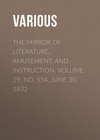Loe raamatut: «The Atlantic Monthly, Volume 05, No. 27, January, 1860», lehekülg 5
I reached my room as soon as possible, and, after assuring myself that my neighbor was still absent, carefully inserted my second nosegay into her keyhole, and rushed from the house as though I had committed burglary.
I was very young then, very romantic, and wholly wanting in assurance. I must have been, or I should never have regarded it as a crime, not against myself, but others, that I was making my days miserable and my nights sleepless on account of two young girls, one of whom I had never seen, and the other of whom was merely a flower-merchant.
When I clambered up to my room late that night, the flowers were no longer where I had put them. I had been torturing myself all the evening with the thought that Hermine might have felt offended, and that I should find them torn in pieces and thrown down at my door, or that she would be waiting for me with a severe reprimand for my boldness and impertinence. But I could find no trace of them, and went to sleep, soothed by the conviction that they had been carefully put by in a glass of water, or were occupying a place on her pillow by the side of her dainty cheek. I feared to meet Thérèse's sorrowful face again the next night, and was troubled so much by the thought of it through the day, that I fairly deserted her that evening and bought my two bouquets elsewhere. With one of these, which I had taken care should be of a finer quality than before, I repeated my experiment of the preceding night and with the same gratifying result. But the day after, forgetting, until it was too late, that I had given Thérèse fair cause to be seriously angry with me, habit carried me to my old resort again, though I had fully determined to reach home by another way, and to patronize, for the future, my new bouquetière, who was not only old and ugly, but of the masculine gender. Habit—and perhaps wish had something to do with it—was too strong, however, and I found myself turning down the Quai Voltaire at the customary hour the next evening.
Much to my surprise, and somewhat to my mortification, Thérèse greeted me with her old sunny smile. Her "Bon jour, Monsieur," was as cordial as ever; and it even seemed to me—and that didn't in the least tend to compose me—that her eyes sparkled with an archness which I had never seen in them before, and that her voice had in it a tinge of malice, as she held out to me two of her finest bunches, saying,—
"Est-ce que, Monsieur en desire deux encore ce soir?"
I was very angry with her for being in such good-humor, and believe I was anything but aimable or polite with her. Why did she not look hurt or offended and reproach me for my desertion, instead of almost disarming my senseless anger by her gentleness?
"It seems that Monsieur forgets his old friends, sometimes," she continued, as I took the flowers she had been holding towards me, and was fumbling in my pocket for the change.
"Forget!" I stammered; for the temper I found her in had so completely ruffled mine, that I was hardly sufficiently master of myself to be able to answer her at all,—"what makes you think I forget? Am I not here this evening, as usual?"
"This evening, yes,—but last night you did not come; or were you here too late to find me? I"–she paused, and, with her color a little heightened, as though she had narrowly escaped making a disclosure, looked another way,—"Monsieur must have bought his flowers elsewhere, yesterday. Were they as fresh and sweet as mine?"
"But how do you know, Mademoiselle,"—I answered, after I had given her a long opportunity to add what I had hoped would follow that long-drawn-out "I"; (she was going to say, I was sure, that she had waited for me to come as long as was possible;)—"How do you know that I bought my flowers elsewhere, or that I bought any? And where can I find finer ones than you give me?"
"Monsieur is kind enough to say so," she returned. "Can you excuse my indiscretion? I only thought, that, as you never miss carrying a bunch of flowers home with you, and sometimes two," she added, with a wicked twinkle in the corner of her mouth, "you must have found some better than mine, last night. But Monsieur will, of course, act his own pleasure."
Thérèse had never appeared to me more charming than at that moment. I wondered afterwards how I had been able to tear myself away from her, and was almost angry that I had not thrown down my second bunch, had not vowed to her that I would never desert her again, and had not confessed that the pain I had suffered from my folly had more than equalled hers, since I was never so happy as when I could be near and see her and hear the music of her voice.
And this was my life, and these the pains I used to suffer. Two tender passions held alternate possession of my fickle heart, and a constant struggle was always waging between them for the mastery; and the impossibility of deciding in favor of either of them, which to accept and which deny, prevented my yielding to either. Thérèse, however, whose real presence I could enjoy, upon whose delicious beauty I could feast my eyes whenever the fancy seized me, and whose voice I could hear, even when separated from her, possessed a fearful advantage over her invisible rival, who maintained her position in my interest only by preserving her incognito and maintaining my curiosity strained to the highest pitch. My acquaintance with Thérèse became daily more intimate, and was soon upon such a footing as seemed to authorize my asking her to accompany me on a Sunday jaunt to one of the thousand resorts of Parisian pleasure-seekers just beyond the barriers of the city.
She accepted,—of course she did,—and the matter was finally arranged one Saturday evening for the next day. I was to find her at the house of her aunt, who lived in my neighborhood, and who, to my surprise, turned out to be the proprietress of the Laiterie I frequented. Here we were to breakfast, and afterwards take the proper conveyance to our destination, which I think was Belleville.
Sunday came, and with it came such weather as the gods seldom vouchsafe to mortals who contemplate visiting the country. It was one of those cloudless days in early June when all Nature, and yourself more than anything else in Nature, seems as though it had been taking Champagne,—not too warm, but sufficiently so to make out-of-door life a luxury, and an excursion like ours into the country almost a necessity.
Thérèse, like everything else in Nature on that summer's day, was more gloriously beautiful, in my eyes, than ever before. Hermine's ideal beauty, and with it her chance of success, faded out from my memory like an unfixed photograph, before this charming reality, and Thérèse ruled supreme. She had dressed herself with a taste which surprised even me, who had so long regarded her as irreproachable, as she was unapproachable, in that particular; and the joy she felt at the thought of a whole day's ramble in the country showed itself in every feature of her countenance, in every movement, and in every tone of her voice. There didn't live a prouder or a happier man than I was, as we made our way arm in arm towards the Place Dauphine, where we were to take the omnibus for Belleville.
We ran wild in the woods and fields all that day, we fed the fishes in the ponds, we made ourselves dizzy on the seesaws and merry-go-rounds, and at last, fairly tired out, and feeling desperately and most unromantically hungry, turned into the neatest and least frequented restaurant we could find and ordered our dinner.
Thérèse was no gourmande, luckily. Her tastes were simple and harmonized admirably with my slender means. We dined, however, like princes, and drank a bottle of Château Margeaux, instead of the vin ordinaire, which was my ordinary wine. Thérèse's gayety had fairly inoculated me, and, forgetting my usual reserve, we laughed and chatted as noisily as a couple of children.
"Upon my word," cried I, as I caught sight of a bouquet of flowers in the room we occupied, "what a couple of ninnies we have been! We have forgotten to get any flowers to carry home with us. But I suppose you see too many of them through the week to care for them to-day."
"Oh, no!" replied Thérèse. "I could never see too much of flowers; and besides, you must have a bunch to carry home to Mademoiselle this evening. She will never forgive you, if you neglect her to-day. And what would she think or say, if she knew where you are now and whom you are with? She is very fond of flowers,—when they come from you, I mean."
"Well," I stammered, and my face burned like fire. "What Mademoiselle? And what makes you think that I make presents of the flowers I get of you? I only get them for myself, and as an excuse for seeing you."
"Ah! menteur!" cried Thérèse, shaking her finger at me with mock solemnity. "Fi donc! c'est vilain. Do you think I have no eyes, or that you have none that speak as plainly as your mouth, and more truly? You try to deceive me, Monsieur!" and the little hypocrite assumed so injured and heart-broken an expression and tone, that I was almost wild with remorse, and cursed the wretch who had placed the flowers in the room, and myself for having noticed them. I should have been hurried into I don't know what expressions of attachment to her and of indifference towards every other individual of her sex, if she had not prevented me by the following startling remark.
"I know to whom you give the flowers you value so much as coming from me. It is to your next-door neighbor, who pleases you more than I do, and whom you have known, perhaps, longer than you have me. Why didn't you invite her, and not me, to come with you to-day? It would have been better."
"Ah!" cried I, "do you know her? She told you about it? Why doesn't she let me see her? Is her name Hermine?"
And almost before I knew it, I had told her the whole story of my passion for my invisible neighbor.
Thérèse pouted, and turned her back. She put her handkerchief to her face, and called me all sorts of hard names for having brought her there to listen to the confession of my love for another; and turned a deaf ear, or I thought she did, to my expostulations and my protestations that I didn't really care for Hermine,—that it was only a passing fancy, more curiosity than anything else,—and that I really loved no one but her.
She began to relent at last, though I was half inclined to be sorry, for her resentment became her even better than her good-humor.
"Well," she said, finally, "it is too tiresome to quarrel, and I will forgive; for, although you say you have never seen Hermine,—(that is a prettier name than Thérèse, isn't it?)—she has, perhaps, seen you, and may really love you "—
"But I don't love her," I cried. "I don't want to love her. I don't want to see her. Her name isn't Hermine, I know. I will never think of her again, nor make a fool of myself by putting nose-gays into her keyhole, if you will only not look so sober any more."
"She will be very sorry for that, I am sure," returned Thérèse, with a smile I could not translate; "and she will miss them very much. I judge her by myself. I always find a bunch at my door when I go home at night"—
"You! You find flowers at your door? And who puts them there?" And I took my turn at being provoked. "You haven't used me fairly, Thérèse, to make me understand all this time that you cared for no one but me. There is some one, then, whom you love and who loves you?"
"Oh, yes!" she answered, her whole face beaming with a pleasure which made me feel like committing a murder or a suicide; "oh, yes! I believe he does; he has almost told me so. And—and I know that I do. But he is so droll! He is my next-door neighbor, and has never seen me yet, and has never tried to, I believe; but he leaves a bunch of flowers at my door every evening, and calls me—Hermine."
"Hermine! You Hermine? Hurrah!"
And before she could prevent me, I held her in my arms, and, in spite of her struggles, had kissed her forehead, eyes, hair, nose, and lips before she could extricate herself, and then went round the room in a wild dance of perfect joy and relief.
"I knew I could love no one else, Thérèse-Hermine, or Hermine-Thérèse! I knew there must be some good and sufficient reason for the unaccountable attraction my neighbor was exercising over me. Why didn't you tell me sooner, méchante? I suppose you never would have done so at all, if we had not come out here to-day. Suppose I had not asked you to come with me?"
"Wouldn't you have asked me?" she answered, with so much winning grace and in such a pleading tone that I found myself obliged to repeat the operation of a few lines above. "Wouldn't you have asked me? I don't know what I should have done," she continued, sadly and thoughtfully. "Oh, yes!" she exclaimed, jumping up and clapping her hands, while her whole face was radiant with triumph. "Oh, yes! then I should have been Hermine, and you would have asked her."
Two happier young people than Thérèse and myself never, I am confident, returned by rail from a day's excursion in the country. Our happy faces, our rapid talking, and our devotion to each other, which we took no pains to conceal, attracted the attention of all about us,—and I heard one father of a family, who was returning to Paris with a half score of cross, tired, and crying children, whisper to his wife, as he pointed towards us,—"That is a couple in their honey-moon, or else lovers; how happy they are!"
And that is the way in which I stumbled into wedlock. How many others, in their pursuit of what has seemed to them the substance, have failed to discover, perhaps too late, that they were following a flitting shadow,—while I, favored mortal, in my chase of a dream, stumbled upon the greatest real good of my whole life!
* * * * *
THROUGH THE FIELDS TO SAINT PETER'S
There's a by-road to Saint Peter's. First you swing across the Tiber
In a ferry-boat that floats you in a minute from the crowd;
Then through high-hedged lanes you saunter; then by fields and sunny
pastures;
And beyond, the wondrous dome uprises like a golden cloud.
And this morning,—Easter morning,—while the streets were thronged
with people,
And all Rome moved toward the Apostle's temple by the usual way,
I strolled by the fields and hedges,—stopping now to view the
landscape,
Now to sketch the lazy cattle in the April grass that lay.
Galaxies of buttercups and daisies ran along the meadows,—
Rosy flushes of red clover,—blossoming shrubs and sprouting vines;
Overhead the larks were singing, heeding not the bells a-ringing,—
Little knew they of the Pasqua, or the proud Saint Peter's shrines.
Contadini, men and women, in their very best apparel,
Trooping one behind another, chatted all along the roads;
Boys were pitching quoits and coppers; old men in the sun were basking:
In the festive smile of Heaven all laid aside their weary loads.
Underneath an ancient portal, soon I passed into the city;
Entered San Pietro's Square, now thronged with upward crowding forms;
Past the Cardinals' gilded coaches, and the gorgeous scarlet lackeys,
And the flashing files of soldiers, and black priests in gloomy swarms.
All were moving to the temple. Push aside the ponderous curtain!
Lo! the glorious heights of marble, melting in the golden dome,
Where the grand mosaic pictures, veiled in warm and misty softness,
Swim in faith's religious trances,—high above all heights of Rome.
Grand as Pergolesi chantings, lovely as a dream of Titian,
Tones and tints and chastened splendors wreathed and grouped in sweet
accord;
While through nave and transept pealing, soar and sink the choral
voices,
Telling of the death and glorious resurrection of the Lord.
But, ah, fatal degradation for this temple of the nations!
For the soul is never lifted by the accord of sights and sound;
But yon priest in gold and satin, murmuring with his ghostly Latin,
Drags it from its natural flights, and trails its plumage on the ground.
And to-day the Pope is heading his whole army of gay puppets,
And the great machinery round us moving with an extra show:
Genuflexions, censers, mitres, mystic motions, candle-lighters,
And the juggling show of relics to the crowd that gapes below,
Till at last they show the Pontiff, a lay figure stuffed and tinselled;
Under canopy and fan-plumes he is borne in splendor proud
To a show-box of the temple overlooking the Piazza;
There he gives his benediction to the long-expectant crowd.
Benediction! while the people, blighted, cursed by superstition,
Steeped in ignorance and darkness, taxed and starved, looks up and begs
For a little light and freedom, for a little law and justice,—
That at least the cup so bitter it may drain not to the dregs!
Benediction! while old error keeps alive a nameless terror!
Benediction! while the poison at each pore is entering deep,
And the sap is slowly withered, and the wormy fruit is gathered,
And a vampire sucks the life out while the soul is fanned asleep!
Oh, the splendor gluts the senses, while the spirit pines and dwindles!
Mother Church is but a dry-nurse, singing while her infant moans;
While anon a cake or rattle gives a little half-oblivion,
And the sweetness and the glitter mingle with her drowsy tones.
But the infant moans and tosses with a nameless want and anguish,
While, with coarse, unmeaning bushings, louder sings the hireling
nurse,—
Knows no better, in her dull and superannuated blindness,—
Tries no potion,—seeks no nurture,—but consents to worse and worse.
If such be thy ultimation, Church of infinite pretension,—
Such within thy chosen garden be the flowers and fruits you bear,—
Oh, give me the book of Nature, open wide to every creature,
And the unconsecrated thoughts that spring like daisies everywhere!
Send me to the woods and waters,—to the studio,—to the market!
Give me simple conversation, books, arts, sports, and friends sincere!
Let no priest be e'er my tutor! on my brow no label written!
Coin or passport to salvation, rather none, than beg it here!
Give me air, and not a prison,—love for Heart, and light for Reason!
Let me walk no slave or bigot,—God's untrammelled, fearless child!
Yield me rights each soul is born to,—rights not given and not taken,—
Free to Cardinals and Princes and Campagna shepherds wild.
Like these Roman fountains gushing clear and sweet in open spaces,
Where the poorest beggar stoops to drink, and none can say him nay,—
Let the Law, the Truth, be common, free to man and child and woman,
Living waters for the souls that now in sickness waste away!
Therefore are these fields far sweeter than yon temple of Saint Peter;
Through this grander dome of azure God looks down and blesses all;
In these fields the birds sing clearer, to the Eternal Heart are nearer,
Than the sad monastic chants that yonder on my ears did fall.
Never smiled Christ's holy Vicar on the heretic and sinner
As this sun—true type of Godhead—smiles o'er all the peopled land!
Sweeter smells this blowing clover than the perfume of the censer,
And the touch of Spring is kinder than the Pontiff's jewelled hand!
THE EXPERIENCE OF SAMUEL ABSALOM, FILIBUSTER
Some time after the departure of the riflemen, a detail of eight or nine men from our company was ordered off towards the lake shore, and soon afterward another smaller one to Potosí, a little village four or five miles to the northward of Rivas, bearing orders to Captain Finney's rangers, who had gone to scout in that direction. The rest of us ate supper, and then lay listening for the boom of the little field-piece, which should tell us that the rifles had met the enemy. But the extraordinary toils and watchings of the last fortnight were too overpowering, and we were all soon buried in dreamless sleep.
In an hour or two I was awakened by horses' feet clattering over the stony pavement of the portería, or gateway to the square courtyard, in one of whose surrounding corridors we usually slept,—on blankets, cow-hides, or hard tiles, according as each man was able to furnish himself. It was the party returning from their scout on the lake. They unsaddled and fed their animals in the yard, and afterward set about frying plantains and fresh stolen pork for supper. As they talked over their provant in the room behind me, I caught most of their adventure, without the discomfort of rising or asking questions. Near the lake they had chased and captured some natives, whose behavior was suspicious and showed no good-will toward the Americans. The officer of the party, thinking them spies, had carried them part of the way to Rivas to be examined; but, fortunately, perhaps, for the captives, he afterwards relented and set them at liberty. They also talked of a small boy who had peeped out of the bushes as they rode by, and shouted to them, "Quieren for Walker?" (Are you for Walker?) and then adding energetically, "Yo no quiero filibustero god-damn!" darted away out of sight, before any one, who was so minded, could have shot the little rebel.
"Be sure," said one of the men at supper,—a noted croaker and tried coward, against whom I bear a private grudge,—"the boys have learned this from the old greasers; and we are going to have all the people of Nicaragua to fight."
Later in the night, the other party, which had been sent to Potosí, came in with panting mules, excited countenances, and one of their number stained with blood from a wound on his thigh. They told us, that, failing to find Captain Finney at Potosí, they had stretched their orders, and gone forward to Obraja, unaware that it was occupied by the enemy. At the entrance of the village, whilst riding on in complete darkness, they were challenged suddenly in Spanish. Taken by surprise, they replied in English, and, before they could turn their animals, were stunned with the glare and crash of a musket-volley, a few feet ahead of them. They recoiled, and fled with such precipitation that one of the riders was tossed over his horse's head;—however, scrambling to his feet, he found sense and good-luck to remount; and the whole party made good their flight to Rivas, with no further damage than two slight flesh-wounds,—one on the trooper, and one on his mule.
The excitement upon this arrival soon subsided, and I had again fallen into unconsciousness, when a rough shake of the shoulder aroused me, and the voice of the old sergeant dinned in my ear,—"Come here! saddle up! saddle up! You are detailed for Obraja." In a few moments I was mounted, and, with two others of the company, rode out of the gateway into the street. There we found awaiting us a fourth horseman, charged with orders for the riflemen at Obraja, and whom it was our duty to accompany as guard.
After clearing Rivas, we clattered over the road at a fast pace, rousing all the dogs at the haciendas as we passed, and leaving them baying behind us, until we came to where the Potosí road forked off to the right; thenceforward, fearing an ambush, we rode slowly and with great caution, stopping often to dismount and reconnoitre moon-lit fields beyond the roadside hedges. At length, after passing a picket of our riflemen, we came to a large adobe house directly on the roadside, where we found the main body of the detachment encamped and sleeping. The house stood something under half a mile from Obraja, and was the residence of that friendly alcalde who on the approach of the enemy had removed with his family to Rivas, and placed General Walker on his guard. As we rode into the yard, we had some ado to keep our horses from treading on the sleeping soldiers, who lay scattered all round the building, and also in its open corridor fronting toward Obraja. Dismounting here, our courier went into the house to communicate with Colonel O'Neal, the commander of the detachment,—leaving it to us either to tie up, and lie where we were until morning, or pass farther up the road, where Captain Finney's rangers were stationed. I chose to go forward and hear the rangers' story, who, we were told, had had a slight brush with the enemy in the beginning of the night.
After riding near quarter of a mile, I came to another adobe building on the roadside, occupied by a small party, and forming Colonel O'Neal's advanced post, at the distance of four hundred yards or more from Obraja. Here they told me that Captain Finney's company, whilst riding into Obraja early in the night, had been hotly fired upon, and Captain Finney himself was brought off struck in the breast, wounded mortally. The riflemen had as yet made no attack, but awaited daylight. The number of the enemy was not known; though rumor placed it between one thousand and fifteen hundred. Whatever it was, they were apprehensive; for throughout the night we heard them barricading the town with great hurry and clatter; and it gave us sad discomfort to think that in the morning there would be these walls to climb before our men could get at them. It was the occasion of much bitter cursing that there should be delay until this was accomplished, and of one man's protesting seriously that it was, and had been, General Walker's endeavor, not to whip the greasers, but to get as many Americans killed in Nicaragua as possible,—he nourishing secret and implacable hatred against them for some cause. However, I think this judgment weak and improbable, though plausible enough from some points of view.
During the night there was some firing between our party and the enemy from under cover in front, with some few wounds, and one man on our side shot through the hat,—who thereupon, pulling off the injured head-piece, and looking at it gravely, declared he would always thenceforward wear his hat with a high crown; for, said he, had this one been half an inch lower, the bullet must have struck the head:—which drollery, in consideration of the circumstances, was allowed to pass for an exceeding good stroke.
We passed a disturbed and rather uneasy night, fearful all the time of being cut off or overwhelmed. But morning breaking at length, a party of riflemen came up from Colonel O'Neal's camp below, and affairs were immediately changed for the offensive. The riflemen moved forward against the town, whilst the rangers were posted at several points along the road to guard against surprise from the bushes. Among these latter I took my stand. The squad which went forward could not have numbered above sixty men, and was armed with Mississippi rifles only,—without wheel-piece of any kind, or even bayonets. I took them for a party of skirmishers, sent ahead to clear the way; yet they were not followed or supported by any additional force that I saw then or afterwards.
As they passed up the road, I observed that the most listless and dead amongst them were at length stirred up and thoroughly awake,—though not with enthusiasm or martial impatience. Some seemed uneasy and careworn, and glanced about nervously; had their countenances not been unalterably yellow, they would certainly have been white. One fellow near the rear was trembling sadly, and carried his rifle in an unreasonable manner,—promising aimless discharges, and, perhaps, dodgings into the bushes. But this one was excusable, and I may have slandered him; for ague had shaken the life almost out of him so often that shaking was become natural, and little else could be expected of him; and, furthermore, a pale face or unsteady joints are not always weathercock to a fainting spirit. In some constitutions these may come from other emotions than fear; and it often happens that your most lamentable shaker will stand you longer at the breach than the man of iron nerve, with a white liver. I have seen such. However, the majority of these were resolute and dangerous-looking men, and, though without any marks of inordinate zeal, seemed willing enough to fight whatever appeared. They held their rifles in the hand cocked, and, as they advanced, threw their eyes sharply into the bushes on either side the road,—having received orders to shoot the first greaser that showed himself, without awaiting the word.
In a few moments after, the party having disappeared behind a turn of the road, we suddenly heard the cracking of their rifles, mingled with the deeper crash of more numerous musketry; and it was a vivid sensation, new to me, that some of those bullets were surely finding billets in the bodies of men. This seemed an encounter with a force of the enemy outside of the town; and directly we thought, from the movement of the noise, that our riflemen were driving them in. Then there was a louder and more rapid volleying of musketry, which completely drowned the rifles, and seemed to tell us that our men were come in sight of the barricades. This lasted but a moment, when it was succeeded by a scattered fire of fewer guns, and finally by irregular volleys. We knew that our men had fallen back; and we had not once thought it would be otherwise. Indeed, it had been a rarely preposterous enemy who should allow himself to be driven from behind a rampart by that handful of dispirited, men.
Whilst things were on this foot, the courier of last night came up with his guard, having been sent by Colonel O'Neal, who had remained at the alcalde's house below, to get news of the attacking party. As I was still under his orders, I joined him, and rode forward towards the combatants,—not without sundry misgivings, known to most men who are about to enter a fray for the first time,—or the twentieth time, perhaps, if the truth were confessed. We found the riflemen drawn up in the road, protected by the raised side-bank and cactus-hedge from an enemy concealed amongst some trees and bushes, a little distance to the right of the road in front. Above the trees, within pistol-shot, was visible the red roof of a church which stood on the plaza of Obraja, where were barricaded, as they said, over a thousand greaser soldiers. All other sign of the town than this one roof was shut in from view by the abundant foliage which embowered it. As we approached the riflemen, we dismounted and led our horses, fearing to attract a shower from the enemy, who lay in the bushes firing irregularly. The officer of the party told us to report to Colonel O'Neal that he had advanced within sight of the plaza, and, finding it strongly barricaded, and "swarming with greasers," he held it folly to assail it with fifty men, and so had retreated. He mentioned some loss,—very small for the noise that had been made,—of which I remember the name of one Lieutenant Webster, shot through the head. He charged us to ask Colonel O'Neal's permission to fall back on the adobe where we had passed the night, as the enemy appeared to be moving around his right, and he was fearful of being surrounded in the open road. But, directly after, seeing the enemy were in earnest to cut him off, he concluded to fall back on the house upon his own responsibility, and did so, and with the adobe walls around him probably felt secure enough against such an enemy.




















